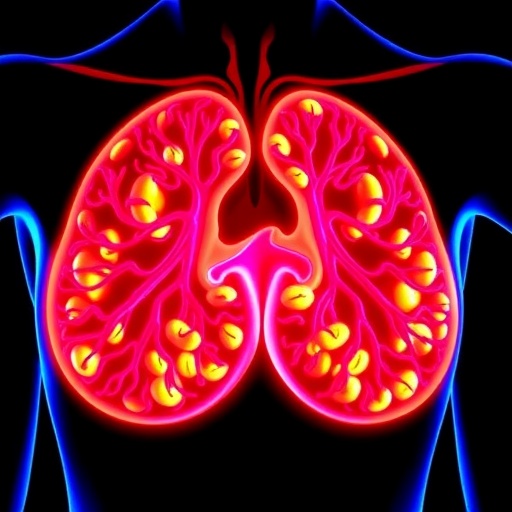In an era where precision medicine is rapidly transforming cancer treatment paradigms, innovative approaches that harness the power of advanced imaging and artificial intelligence are at the forefront of oncological research. A recent breakthrough study spearheaded by Jiang, Low, Huang, and their team has demonstrated the potential of 18F-FDG PET/CT-based deep radiomic models to significantly enhance the prediction accuracy of chemotherapy responses in breast cancer patients. This pioneering work, reported in Medical Oncology in 2025, marks a significant stride toward personalized therapeutic strategies, promising to refine clinical decision-making and improve patient outcomes.
The challenge of predicting how breast cancer will respond to chemotherapy remains a critical bottleneck in oncology. Traditional biopsy methods, though informative, offer limited insights and suffer from spatial sampling bias due to the heterogeneous nature of tumors. Radiomics, an emerging discipline that extracts high-dimensional quantitative features from medical images, offers an unprecedented window into tumor biology beyond what is visible to the naked eye. By integrating 18F-fluorodeoxyglucose positron emission tomography/computed tomography (18F-FDG PET/CT) imaging with deep learning algorithms, the new approach captures complex tumor phenotypes and metabolic patterns associated with treatment efficacy.
At the heart of this research lies 18F-FDG PET/CT, a hybrid imaging modality that combines metabolic and anatomical information. 18F-FDG, a radiolabeled glucose analog, is preferentially taken up by highly metabolic tumor cells, enabling visualization of active malignancies and their aggressive phenotypes. The CT component, on the other hand, provides structural information that complements metabolic data. By employing deep radiomic modeling on this multi-dimensional dataset, the researchers developed algorithms capable of discerning subtle variations in tumor texture, intensity, and shape that correlate with chemotherapy responsiveness.
The study incorporated a robust dataset of breast cancer patients undergoing neoadjuvant chemotherapy, harnessing 18F-FDG PET/CT imaging data acquired at multiple time points. Through rigorous feature extraction and preprocessing, the team converted these images into comprehensive radiomic profiles. These profiles served as inputs for deep learning models—specifically convolutional neural networks—that were trained to identify patterns predictive of pathological complete response (pCR), a key indicator of effective chemotherapy. The models underwent stringent validation procedures to ensure generalizability and reliability.
Remarkably, the deep radiomic models demonstrated superior performance when compared to conventional clinical and imaging predictors. Metrics such as accuracy, sensitivity, and specificity in predicting chemotherapy outcomes were significantly enhanced, underscoring the efficacy of combining metabolic imaging with deep radiomics. Notably, the model’s ability to predict pCR prior to treatment initiation opens avenues for early therapeutic stratification, potentially sparing non-responders from unnecessary toxicity and guiding them toward alternative regimens.
One of the intrinsic advantages of this methodology is its non-invasive nature, relying solely on routinely acquired imaging to generate predictive insights. This feature not only reduces patient burden but also facilitates seamless integration into existing clinical workflows. Furthermore, the repeatability of PET/CT scans offers opportunities for dynamic monitoring, allowing clinicians to adjust treatment plans in response to early indications of therapy resistance or sensitivity.
The implications of this research extend beyond breast cancer. The paradigm of combining 18F-FDG PET/CT with deep radiomics could be extrapolated to other solid tumors where metabolic imaging is routinely performed, such as lung, head and neck, and gastrointestinal cancers. By unveiling intricate tumor heterogeneity and metabolic diversity, these models may serve as universal tools for personalized therapy evaluation and prognostication.
Despite the promising results, several challenges remain before widespread clinical deployment can be realized. Data standardization, including harmonization of imaging protocols and feature extraction methods, is essential to replicate results across institutions. Moreover, the interpretability of deep learning models—often criticized as “black boxes”—must be enhanced to provide clinicians with actionable insights and foster trust in automated decision-support systems. The development of hybrid models that integrate radiomics with genomic and molecular data might further bolster predictive power and elucidate underlying biological mechanisms.
Ethical considerations are also paramount as AI-driven diagnostics gain traction. Patient privacy, data security, and unbiased algorithmic design need careful stewardship to prevent disparities and ensure equitable healthcare delivery. Collaborative efforts among oncologists, radiologists, computer scientists, and ethicists will be central to navigating these complex issues.
Looking ahead, prospective clinical trials designed to evaluate the impact of radiomic-based predictions on treatment outcomes are crucial. Such studies will not only validate the clinical utility of these models but also help define standardized endpoints and regulatory pathways. Coupling radiomics with emerging imaging biomarkers, such as hypoxia or immune cell infiltration markers, could further refine response assessment, enabling a multi-dimensional view of tumor behavior.
The integration of artificial intelligence into oncological imaging heralds a new chapter wherein tailored therapies are informed by intricate data signatures invisible to traditional diagnostics. The study by Jiang and colleagues exemplifies how marrying metabolic PET/CT imaging with deep learning can transform chemotherapy response prediction in breast cancer, potentially improving survival rates and quality of life for countless patients.
In conclusion, 18F-FDG PET/CT-based deep radiomic models embody a promising convergence of technology and medicine, paving the way for a future in which cancer treatment is not just reactive but anticipatory and precisely calibrated to each patient’s unique tumor biology. As research in this domain accelerates, the prospect of realizing truly personalized oncology care becomes increasingly attainable, heralding transformative impacts on global cancer management.
Subject of Research:
Prediction of chemotherapy response in breast cancer using 18F-FDG PET/CT-based deep radiomic models.
Article Title:
18F-FDG PET/CT-based deep radiomic models for enhancing chemotherapy response prediction in breast cancer.
Article References:
Jiang, Z., Low, J., Huang, C. et al. 18F-FDG PET/CT-based deep radiomic models for enhancing chemotherapy response prediction in breast cancer.
Med Oncol 42, 425 (2025). https://doi.org/10.1007/s12032-025-02982-0
Image Credits: AI Generated




